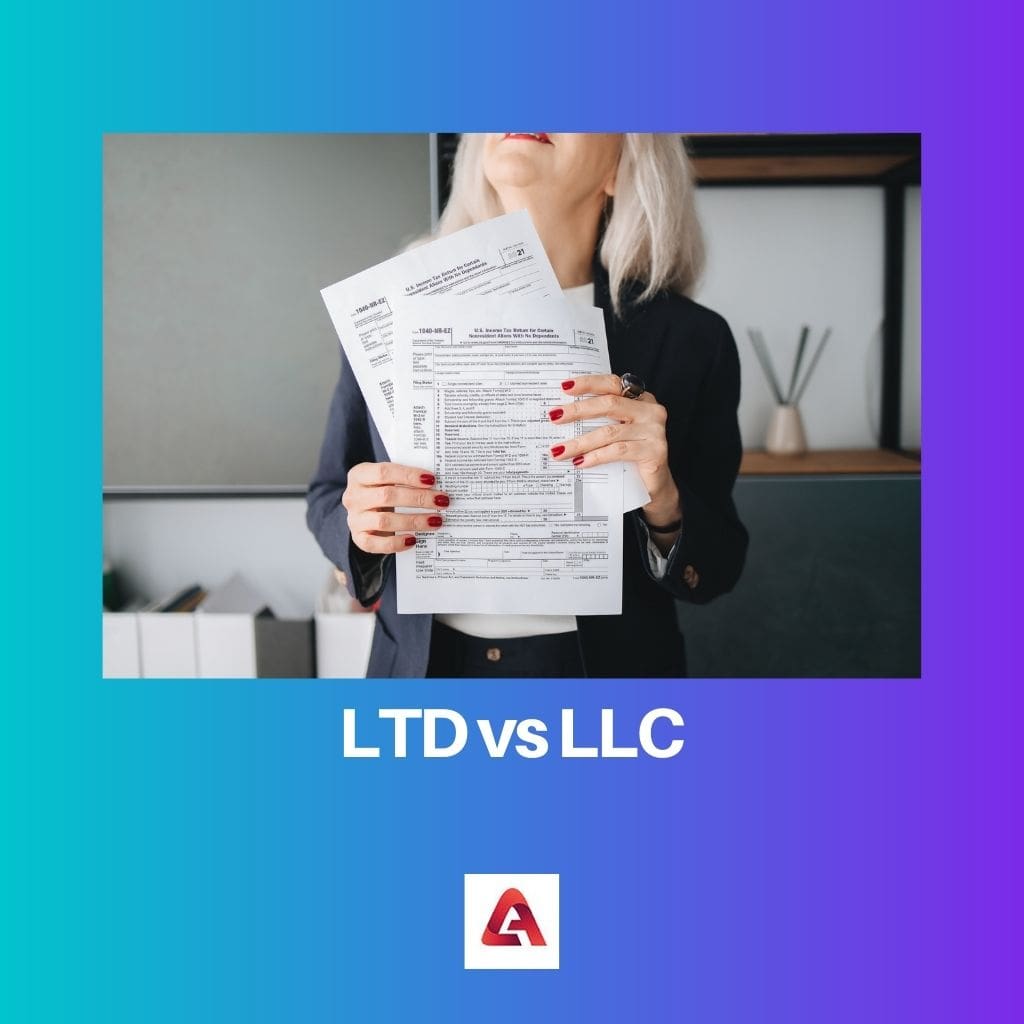It is easy to get wired up about searching for the differences between LTD and LLC, and with the similarities in their names, one ends up even more bewildered.
However, LTD and LLC are as much different as their name sounds similar.
Key Takeaways
- LTD (Limited) is a business structure commonly used in the United Kingdom and other countries, where ownership is divided into shares, and shareholders have limited liability.
- LLC (Limited Liability Company) is a business structure in the United States offering limited liability protection to its members and combining aspects of corporations and partnerships.
- LTD and LLCs provide limited liability protection to their owners, but their formation, governance, and tax requirements differ depending on the jurisdiction.
LTD vs LLC
LTD means Limited Partnership and is when an organization has certain shareholders, called partners, and the laws are regulated under the state. LLC stands for Limited Liability Company and is an organization where the shareholders are members of the company and are protected from liabilities and debt.

LTD is an abbreviation of Limited denoting limited partnership, whereas LLC stands for Limited liability Company that incorporates the benefits of both partnerships and companies.
Another key difference is that the shareholders of an LTD partnership are liable to pay the company’s debt limited to what they have invested. In contrast, in LLC, protection from liabilities depends on the applicable jurisdiction.
Besides, in an LTD, there are limits to the number of shareholders who can invest, whereas, in an LLC, a significant number of members can hold shares in the company. In LTDs, mostly only co-owners are given power.
Comparison Table
| Parameter of Comparison | LTD | LLC |
|---|---|---|
| Full form and structure | Limited denoting limited partnership, having general and limited partners | Limited liability Company protects shareholders from debts and liabilities |
| Shareholders | Only co-owners have shares | It can be one or many |
| Shareholders are called | Partners in the company, mostly co-founders | Members of the company need not be founders |
| Liability protection | Partners are liable to company debt limited to their investment | It depends on the state laws and the applicable jurisdiction |
| Taxation | The company pays tax as a separate entity from the gains and profits made | The company pays no tax; members are taxed from their invoice |
What is LTD?
LTD stands for Limited or limited partnership, and its laws are regulated under state laws. Shareholders of LTD are called partners since there are certain limitations to who can be a shareholder.
Limited partnerships have two kinds of partners; one is a limited partner, and the other is a general partner. A general partner makes all the business decisions; the limited partner is a silent investor.
In a limited partnership, the shareholder is liable to a company’s debt only as much as he invests and is protected from losing extra on the company’s insolvency. However, when a limited partner makes company decisions, he risks losing more.
LTD is an extension used at the end of company names to denote its type of company and the laws that regulate its structure. LTD is, however, never singularly used on its own.
LTD companies pay taxes from their profits as individual entities separate from their owners. The shareholders do not pay any separate taxes. These shareholder benefits are received only by a few people, essentially given only to the co-founders.

What is LLC?
LLC stands for Limited Liability Company and provides some or all the protection from the liabilities of dept to its members. LLCs can attract investors by providing shares since they are eligible to have several shareholders.
A shareholder of an LLC is known as a member, and unlike LTD, all these members enjoy equal protection from the debts and liabilities of the company. An LLC member can also participate in the company’s decision-making without risking assets.
LLC companies have several tax options, such as a sole proprietor, a partnership, an S corporation or a C corporation. The company, however, do not pay taxes as a separate entity.
LLCs are regulated by state laws and are mostly suitable for smaller companies. Another type of LLC is called the Series LLC, which enables the investor to protect their primary assets by designating them to smaller entities.
However, the laws of forming an LLC vary from state to state and require detailed documentation of the organization and its various laws to be submitted to the state.
This article includes rights, powers, duties, liabilities, names and addresses of the LLC’s members, the name of the LLC’s registered agent, etc.

Main Differences Between LTD and LLC
- The main difference between the LTD and LLC is that LTDs pay taxes as a separate entity from its owners, whereas LLCs of options to choose from, such as a sole proprietor, a partnership, an S corporation or a C corporation.
- Another key difference is that the shareholders of an LTD partnership are liable to pay the company’s debt limited to what they have invested, whereas, in LLC, all members have protection from debt and liabilities.
- Shareholders of LTD are called partners since there are certain limitations to who can be a shareholder. In contrast, LLCs can attract investors by providing shares since they are eligible to have several shareholders.
- LTD is an abbreviation of Limited or limited partnership; on the other hand, LLC stands for Limited Liability Company that incorporates the benefits of both partnerships and companies.
- In limited partnerships, when a limited partner involves in company decisions making, he risks losing more. In contrast, an LLC member can also participate in the company’s decision-making without risking assets.


The detailed information about LTD and LLC in this post is invaluable. It offers a well-structured comparison that provides clarity on the differences between these business structures.
Well said, Harris. The article effectively distills complex concepts into an understandable comparison between LTD and LLC, offering great value to the readers.
It’s shocking how many people confuse LTD and LLC, but this clears up any confusion. Great work on putting together such an informative post!
Right, Ryan! It’s surprising how many people aren’t aware of the difference. This article definitely brings clarity to the matter.
Couldn’t agree more, Ryan. This distinction is crucial for entrepreneurs and business owners to understand. This article presents the comparison in a very comprehensive manner.
I found the comparison between LTD and LLC to be fascinating. The article offers an in-depth look at both business structures, making it a valuable read for anyone interested in business law and operations.
This article is enlightening for those navigating the complexities of business structures. It provides detailed insights into LTD and LLC, making it a must-read!
Absolutely, Chloe. The structured comparison and detailed explanations of LTD and LLC in this post are incredibly insightful.
I applaud the author for such a well-researched and thorough comparison between LTD and LLC. It’s refreshing to find informative content that simplifies complex business concepts.
Definitely, Kallen. This article effectively educates readers on the nuances of LTD and LLC in a comprehensive manner.
What a valuable resource! The article presents a clear distinction between LTD and LLC, vital for anyone involved in business. A remarkably well-structured breakdown of complex concepts.
Spot on, Rose! This post is a testament to the author’s expertise and commitment to providing valuable insights into business structures.
Absolutely, Rose. The detailed comparison of LTD and LLC in this article is incredibly informative and well-organized.
This is such helpful information to get a clear understanding of the differences between LTD and LLC. It’s easy to get confused with their similar names, but this post really breaks it down in an informative way.
Absolutely, Tracy! This article does a great job of explaining the key takeaways and differences between LTD and LLC. Definitely a must-read for anyone interested in business structures.
Kudos to the author for this comprehensive comparison between LTD and LLC. The article is a testament to the author’s expertise in simplifying intricate business concepts for the readers.
Absolutely, Benjamin. The author’s approach to breaking down the differences between LTD and LLC showcases their command of business structures and commitment to educating readers.
I couldn’t agree more, Benjamin. This article delivers a clear and precise comparison between LTD and LLC, adding significant value to those seeking knowledge about business organizations.
This post is incredibly helpful. As someone involved in business, understanding the differences between LTD and LLC is crucial, and this article does an exceptional job of explaining those differences.
Absolutely, Ben. The in-depth breakdown of LTD and LLC provides great insights for individuals navigating business structures.
I completely agree, Ben. The clear explanations and detailed comparison make this article a valuable resource for business professionals.
This post is fantastic! It’s an essential read for anyone venturing into the business world. The detailed comparison between LTD and LLC is extremely valuable.
Absolutely, Graham. The author did an excellent job of highlighting the key differences and providing a comprehensive overview of LTD and LLC.
I couldn’t agree more, Graham! This article provides a clear understanding of the distinctions between LTD and LLC. It’s an excellent resource for those seeking information on business structures.